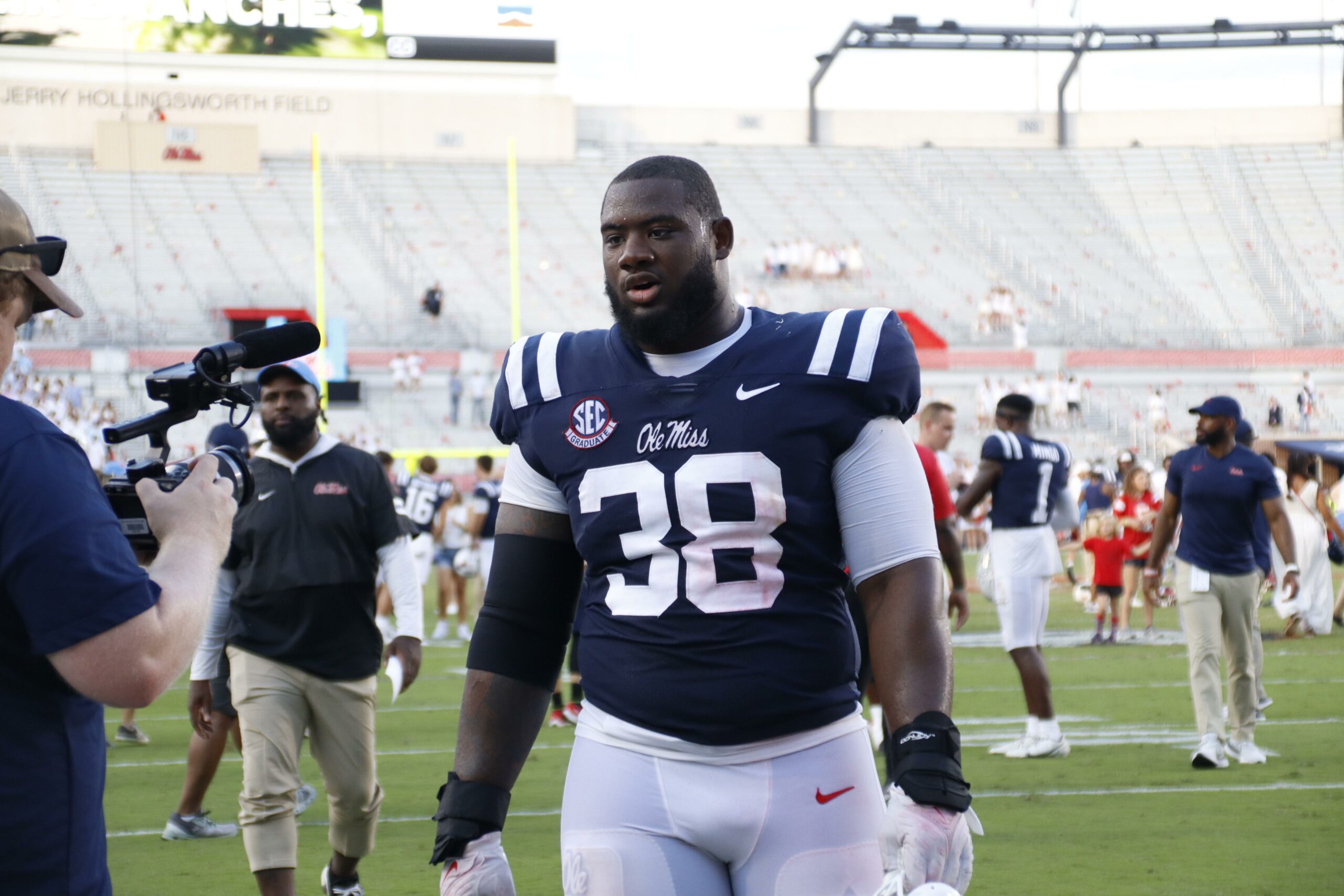Chucky Mullins’ enduring spirit continues to inspire 30+ years after his paralyzing injury, exemplified by the annual awarding of his jersey number 38. From gridiron tragedy to enduring legacy, his story embodies courage, resilience, and the power of the human spirit. The bond forged between Chucky Mullins and Brad Gaines transcended rivalry, showcasing the unifying power of empathy and compassion. Mullins’ legacy extends beyond the Ole Miss community, inspiring athletes and individuals facing adversity to embrace the “Never Quit” mentality.
From Rising Star to Homecoming Heartbreak
It was Homecoming 1989 at Ole Miss. The Rebels were facing Vanderbilt on a crisp autumn day. Amidst the excitement, Chucky Mullins, a redshirt freshman defensive back, took the field. He was a rising star, a young man with a promising future. But this game would tragically alter his life forever. During what seemed like a routine play, Mullins tackled Vanderbilt fullback Brad Gaines. The impact was devastating. Mullins lay motionless on the field, having shattered four cervical vertebrae. The diagnosis: quadriplegia. His football career, his dreams, everything changed in an instant. He was airlifted to Baptist Memorial Hospital in Memphis, where he underwent a tracheotomy and a grueling five-hour bone graft operation.
An Unbreakable Spirit
Mullins’ physical limitations confined his body, but they could not contain his spirit. Less than a year after the accident, he made a momentous decision: he returned to Ole Miss. This wasn’t just about academics; it was a powerful statement of resilience. His presence electrified the campus. He became a symbol of hope, inspiring everyone he met. His unwavering determination radiated through the Ole Miss community. He didn’t seek pity; he demonstrated the power of overcoming adversity.
An unlikely friendship blossomed between Mullins and Brad Gaines, the player involved in the fateful tackle. Bound together by shared pain and healing, their bond transcended the rivalry. It was a testament to forgiveness and connection in the face of tragedy. Discover the hidden gems and rich history of Chelyan West Virginia.
The Legacy of #38: A Number, A Spirit, A Tradition
Tragically, Mullins’ journey was cut short. On May 6, 1991, a pulmonary embolism claimed his life at just 21. But his legacy lives on, especially through the annual Chucky Mullins Courage Award. This award celebrates the qualities Mullins embodied: courage, determination, optimism, and love for the game.
| Year | Chucky Mullins Courage Award Recipient |
|---|---|
| 1990 | Chris Mitchell |
| 1991 | Jeff Carter |
| 1992 | Trea Southerland |
| 1993 | Johnny Dixon |
| … | … |
The number 38, retired after Mullins’ passing, is now bestowed annually upon a defensive player who exemplifies his spirit. Patrick Willis, an Ole Miss legend, was the first to wear the number after its retirement. Coliseum Drive was renamed Chucky Mullins Drive. The book 38: The Chucky Mullins Effect and the documentary Undefeated: The Chucky Mullins Story further cemented his legacy. Even his cousin, Zach Gilbert, a defensive back at Auburn, honored him by wearing number 38. News outlets, including USA Today, continue to revisit his story.
The Weight of 38: Why JJ Pegues Wears the Number
JJ Pegues, the 34th recipient of the Chucky Mullins Courage Award, carries on the tradition of wearing the number 38. It’s a symbol of respect, a link to Mullins’ enduring legacy. For Pegues, an Oxford native, the weight of 38 is particularly significant.
In his own words, “It means everything. Growing up here and hearing about the award…it means the world to honor him, his legacy and keep it going.” While Pegues wears 38 for home games, he sports his regular number 89 with a 38 patch during away games, balancing honoring the past with embracing the present.
| Chucky Mullins Courage Award Recipient | Year |
|---|---|
| JJ Pegues | 2023 |
| … | … |
While we know much about the award’s origins, research continues to explore Mullins’ life and impact. The number 38 serves as a powerful reminder of courage and the enduring spirit of Chucky Mullins.
The Family Who Shaped a Hero: Who Raised Chucky Mullins?
Chucky Mullins’ story is about resilience and the unwavering support of a chosen family. After his mother’s passing when he was in seventh grade, he chose to live with Carver and Karen Phillips in Russellville, Alabama. They became his legal guardians, providing the love and stability he needed. Russellville’s close-knit community likely contributed to his sense of belonging. The Phillips family provided guidance and encouragement, nurturing his dreams.
Mullins excelled at football in high school and earned a spot at Ole Miss. But tragedy struck during the 1989 homecoming game against Vanderbilt. His football dreams were shattered by the spinal cord injury. However, the resilience fostered by the Phillips family did not break. The Ole Miss community rallied around him, raising over $1 million for his care and a specially adapted home.
Remarkably, Mullins returned to Ole Miss in 1990 as a student. He passed away in 1991, but his legacy endures through the Chucky Mullins Courage Award and the renaming of Coliseum Drive to Chucky Mullins Drive.
Chucky Mullins transcended the role of a football player. He became an emblem of resilience, reminding us that even in the face of unimaginable hardship, the human spirit can endure. He didn’t just play the game; he changed it, and the lives of countless others, forever.
- Unveiling Bernhard Caesar Einstein’s Scientific Achievements: A Legacy in Engineering - July 15, 2025
- Uncover who is Jerry McSorley: CEO, Family Man, Business Success Story - July 15, 2025
- Discover Bernhard Caesar Einstein’s Scientific Contributions: Unveiling a Legacy Beyond Einstein - July 15, 2025















